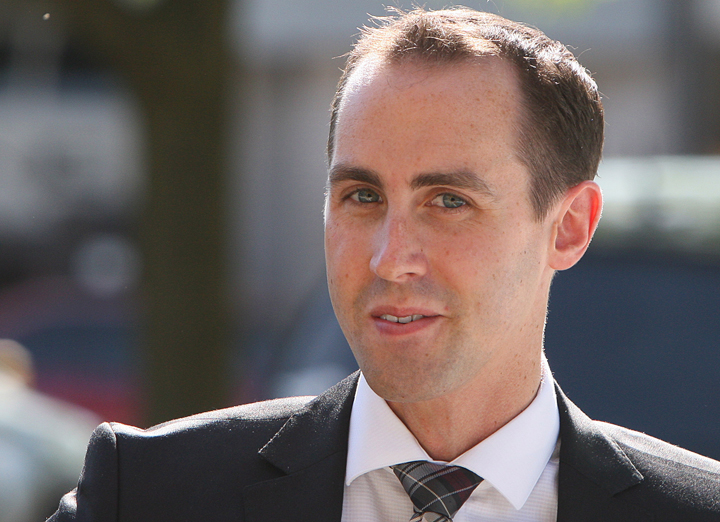GUELPH – Both sides agree: It couldn’t have been just one person behind the robocalls.

But exactly who orchestrated the scheme to mislead Guelph voters during the 2011 election remained the question at the heart of the last day of Michael Sona’s trial.
The 25-year-old former Conservative staffer is the only person charged with preventing people from voting – a crime that carries up to five years of prison if convicted.
Crown prosecutor Croft Michaelson argued Sona was “instrumental” in the scheme that primarily targeted Liberal supporters – and that he was the young man behind the now-infamous Pierre Poutine cellphone.
Sona’s lawyer Norm Boxall cast doubt on Crown’s evidence, labelling key witness Andrew Prescott as “not credible” and suggesting he may have been involved in the scheme along with campaign manager Ken Morgan.
But who Justice Gary Hearn believes will be revealed when he delivers his verdict on August 14.
‘More than one person’
The Crown argued Sona inquired about making anonymous calls days before the May 2 election and, along with Morgan, received information from Prescott about how to create an automated calling account with Edmonton-based company RackNine.
Michaelson said the evidence shows Sona set up a robocalls account under the pseudonym “Pierre Jones,” and also bought prepaid credit cards and a burner cellphone registered as the now-infamous “Pierre Poutine.”
READ MORE: Crown wraps case against Sona in robocalls trial as court hears of possible second person
“I say the evidence points towards Mr. Sona as being ‘Pierre Jones’ and being instrumental in carrying out the scheme,” Michaelson said.
Michaelson suggested Sona did this to retaliate against the Liberals during what many described as a “dirty” campaign.
“He wanted to win the election by preventing Liberal voters from voting.”
But he also said someone else on Conservative candidate Marty Burke’s campaign was likely involved, noting that someone logged onto a proxy server and purchased credit cards at roughly the same time.
“It appears that more than one person was involved in executing the plan,” he said.
That person may have been Morgan, the Crown suggested, who along with Sona had login information about creating a robocalls account.
But Morgan has since moved to Kuwait and did not cooperate with investigators or testify at the five-day trial.
Michaelson said even if Sona aided or abetted someone else, he can be found guilty.
‘Not credible’
Boxall, Sona’s lawyer, suggested there’s more evidence against the Crown’s star witness – Prescott – than his own client.
Prescott received immunity to testify against his former friend in the case.
“Mr. Prescott is just not credible,” Boxall said.
READ MORE: Conservative friends point finger at Michael Sona on Day 3 of robocalls trial
Prescott, who worked as deputy campaign manager, has an information technology background and had set up his own robocalls account during the campaign.
He was also tipped off about the investigation by Matt Meier, who owned the automated calling firm RackNine which was used to make the misleading calls.
Boxall noted that both Prescott and “Pierre Jones” paid for the robocalls using the PayPal system in small dollar amounts.
Prescott also destroyed the computers associated with the campaign after the election.
In his testimony last week, Prescott said that he logged into the Jones account – client 93 – after Morgan told him to stop another round of robocalls from going out on election day.
He also told the court he withheld information from investigators to protect himself.
“Mr. Prescott is deflecting responsibility from himself, and perhaps others,” Boxall said.
Boxall also cast doubt on the recollection of four witnesses, all young current and former Conservative staffers, who testified against Sona.
He said their statements are “unreliable” because at least a year had passed before they first came forward, and they may have been influenced by media reports.
Boxall added it was “somewhat unusual” that three of them had spoken with the Conservative party’s lawyer Arthur Hamilton before meeting with Elections Canada.



Comments